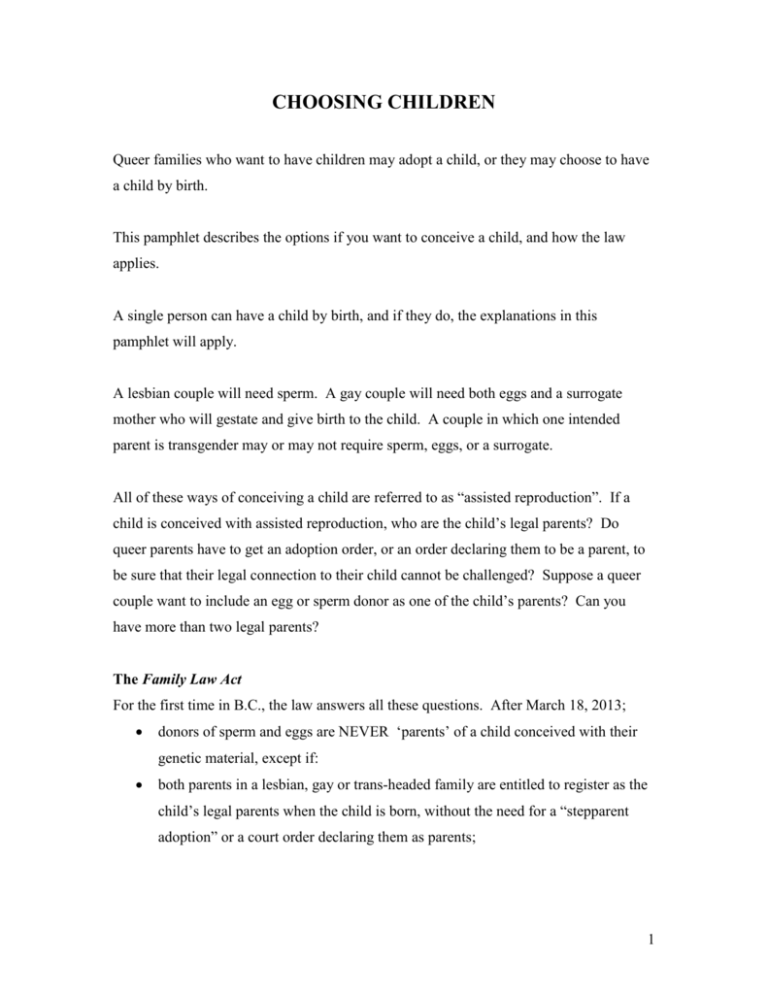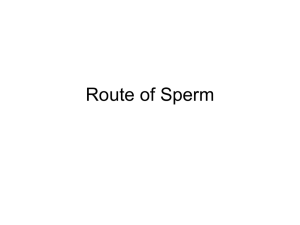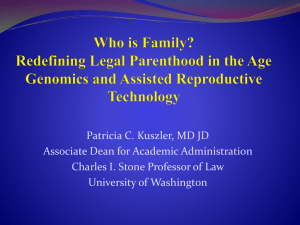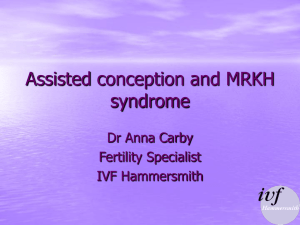Choosing Children: A guide to the Legal Context
advertisement

CHOOSING CHILDREN Queer families who want to have children may adopt a child, or they may choose to have a child by birth. This pamphlet describes the options if you want to conceive a child, and how the law applies. A single person can have a child by birth, and if they do, the explanations in this pamphlet will apply. A lesbian couple will need sperm. A gay couple will need both eggs and a surrogate mother who will gestate and give birth to the child. A couple in which one intended parent is transgender may or may not require sperm, eggs, or a surrogate. All of these ways of conceiving a child are referred to as “assisted reproduction”. If a child is conceived with assisted reproduction, who are the child’s legal parents? Do queer parents have to get an adoption order, or an order declaring them to be a parent, to be sure that their legal connection to their child cannot be challenged? Suppose a queer couple want to include an egg or sperm donor as one of the child’s parents? Can you have more than two legal parents? The Family Law Act For the first time in B.C., the law answers all these questions. After March 18, 2013; donors of sperm and eggs are NEVER ‘parents’ of a child conceived with their genetic material, except if: both parents in a lesbian, gay or trans-headed family are entitled to register as the child’s legal parents when the child is born, without the need for a “stepparent adoption” or a court order declaring them as parents; 1 if a queer couple has agreed with a surrogate mother to carry their child, the couple (and not the surrogate) can be registered as the child’s legal parents when their child is born; you do not have to have a genetic connection to a child in order to be registered as a legal parent of a child when the child is born; it is possible to register more than two people as a child’s legal parents when the child is born, provided that the intended parents have agreed in writing before the child is conceived. These are very big changes. Before the Family Law Act, a birth parent, and a co-parent who was not genetically connected to a child, could be registered with the Vital Statistics Registry, and get a birth certificate showing both of them to be “parents” of their child. But that didn’t make the non-genetic coparent a child’s legal parent. For that to happen, a stepparent adoption or a court order declaring the non-genetic parent to be a child’s legal parent was required. If a surrogate mother carried a child for a queer couple, both intended parents needed a court order, even if one of them had donated sperm or eggs to enable the conception of the child. And it was not possible for a child to have more than two legal parents. Why the Emphasis on “Legal” Parents? There can be many ‘parents’ in a child’s life: the parents she had at birth, and then, if her parents broke up, partners they got together with could become stepparents. Those partners acquired responsibilities as the child’s stepparent. But they never become a legal parent of a child. A child’s legal parent is the person under the law from whom a child would inherit. Who your legal parents are determines who your relatives are, and determines such issues as who you can marry without being guilty of incest. 2 We will examine the situation of lesbian co-parents, gay co-parents, and families with a transgender co-parent. Remember that a single parent can also become a parent. Lesbian Co-Parents Sperm Donation Only A lesbian couple who want to have a child together will need a sperm donation. They can either buy sperm from a fertility clinic, or they can use sperm donated by someone they know. If they buy sperm, they can register both lesbian moms on the child’s birth certificate when the child is born. And that makes them the child’s legal parents, without any further steps being necessary. No expensive adoption or declaration of parentage is required. The same is true if they use sperm from a known donor - with two important cautions. The co-moms must have been in a relationship when the child was conceived. And it matters how the child is conceived. If a donor gives sperm to an intended mom, and she uses the “turkey baster method” to inseminate, both moms can register as their child’s legal parents at birth. But if the bio-mom skips the turkey baster and has sex with the donor, then he and the bio-mom are deemed to be the child’s legal parents. In that case the lesbian co-mom will need an adoption order or a declaration of parentage to confirm that she, and not the sperm donor who had sex with the birth mom, is the child’s second parent. The law specifically says that a sperm donor does not get any rights or responsibilities as a legal parent just by donating sperm. So no donor insemination agreement is necessary. 3 Egg Donation /Surrogacy Even if neither of the lesbian co-moms is able to conceive, or carry, a child, the two comoms can be registered as the child’s legal parents at birth. In that case, they will need in addition to sperm a donation of eggs and a surrogate mother. What Does it Cost? If they need a surrogate mother, and the child will be conceived with donated sperm and the eggs of the surrogate, they may work with a fertility agency, or the surrogate may be inseminated through the turkey baster method. It is illegal to pay for eggs, or sperm. It is also illegal to pay a surrogate a fee for carrying your child, though you can pay the surrogate’s expenses. The law is unclear about what expenses are permitted to be reimbursed. You will want to be clear with the surrogate mother what things will be paid for. If your surrogate is a resident of B.C., she will be able to rely on B.C. Medicare to pay for the cost of delivering the child. If you use the services of a fertility agency, there is of course a charge. Making Sure You are the Legal Parents of a Child Born to a Surrogate If you are a lesbian couple who are planning to have a child with sperm from a donor, and eggs from a woman who will carry the child, what steps do you need to take to make sure you are the two legal parents of the child who is born? As we said, you don’t need a donor insemination agreement. But you do need a written surrogacy agreement, signed between the lesbian co-moms and the surrogate before the child is conceived. And the surrogate will also have to sign a consent to surrender the child, when the child is born. 4 Because the surrogacy agreement has to comply with the Family Law Act to enable you to rely on it to register as the child’s legal parents without needing a court order or an adoption, it is wise to get legal advice before drafting the agreement. Once the child is born, if your paperwork is in order, you can register both of you as the child’s legal parents, with the Vital Statistics Agency. At that point, you are your child’s only legal parents. Neither the sperm donor, nor the surrogate /egg donor, has any parental rights. What if you didn’t know about the need for a pre-conception surrogacy agreement, or your paper work does not comply with the requirements of the Family Law Act? In that case, the Vital Statistics Agency will not register you as the parents of your child. You will need to get a court order declaring you to be the parents of the child. For that you will need the help of a lawyer. Gay Dads If you are a gay couple wanting to have children, you will need to have an egg donor, and a surrogate mother. They may be the same person. As outlined above, you can pay a surrogate mother for her expenses, but you cannot pay her a fee; and you cannot pay for a donation of eggs. You may use a fertility clinic to assist with the insemination. If you are using an egg donor who is different from the surrogate mother, you will have to use the services of a fertility clinic, because they will have to do an extraction of the eggs. An embryo will be created “in vitro” (outside the womb) and implanted in the surrogate mother. If your egg donor and the surrogate mother are the same person, you need to have a surrogacy agreement, signed before the child is conceived; and when your baby is born 5 your surrogate mother will have to sign a consent and give the baby to you. See above for a description of the surrogacy agreement. With that paperwork in hand, you and your partner can register as your child’s legal parents at the birth of your child. You are then the child’s only legal parents, for all purposes of the law. If for some reason your paperwork is not in order, you will need to make an application for a “declaration of parentage”. You will need legal help to do that. Transgender Families A couple may include one or two transgender individuals. A trans person is someone whose sense of their own gender is not congruent with the other gender indicators such as their primary or secondary sex characteristics, or their chromosomal or hormonal makeup. For trans people whose situation is acute, medical treatment involves sex reassignment surgery (SRS) and hormone treatments. An individual changes their body so that it is congruent with their own sense of their gender. A male to female trans person who has SRS will have her testes removed, and her penis inverted to create a vagina; and she will have breast augmentation. She will take feminizing hormones. A female to male trans person will have chest contouring, along with masculinizing hormones. He may have a hysterectomy and a surgically-constructed penis. So how does a trans person prepare for parentage? First, he or she can plan ahead, by freezing sperm or eggs to be used to conceive a child, down the road. In that case, the trans person is using their own genetic material, for their own parental project, so they are, under the law, one of the child’s legal parents. 6 In some cases, a transman may be able to give birth to a child. If he has not had a hysterectomy, he may conceive and/or carry a child. He will discontinue masculinizing hormones to do so. In that situation the transman will be registered as the child’s “birth mother’ because the law defines “birth mother” as the person from whose body a child was delivered. But the child’s birth certificate will show him as “parent”. Multiple Parents A big change in the law in B.C. is that a child can now have more than two legal parents. Provided that all of the prospective parents agree in writing, before a child is conceived, a donor of sperm or eggs, a surrogate mother, and perhaps the partners of those individuals, may also be registered as a legal parent of the child. Then the child’s birth certificate will show whichever of those people has agreed to be a co-parent as a legal parent on the child’s birth certificate. Because it is important that the agreements satisfy the requirements of the Family Law Act in order that all the child’s prospective parents can be registered on the child’ birth certificate without the need for a court order, it is wise to get legal advice before creating the agreement among the parents. Birth Certificates All of a child’s parents are listed on his birth certificate, and all of them have the word ‘parent’, regardless of how many parents a child has. The words ‘mother’ or ‘father’ do not appear any longer on birth certificates in British Columbia. 7 Appendix Thanks to Genesis Fertility Clinic Assisted Reproduction Defined In Vitro Fertilization In vitro fertilization is a procedure whereby an egg is extracted from a woman, and fertilized “in vitro”. Then the embryo is implanted in the woman who will carry the fetus to term. Intracytoplasmic Sperm Injection (ICSI) Intracytoplasmic Sperm Injection (ICSI) is a specialized form of in vitro fertilization (IVF) most often used for men who have poor sperm quality or low sperm counts. During an ICSI procedure, a single sperm is injected into each mature egg. ICSI has revolutionized the treatment of male infertility. To date, tens of thousands of children have been born around the world as the result of ICSI. What are Ovulation Induction & Superovulation? Ovulation induction and superovulation are terms to describe the use of injectable fertility drugs (gonadotropins) to stimulate the ovaries to produce mature eggs. The goal of ovulation induction (OI) is to grow and ovulate an egg in a woman who normally does not ovulate, while the goal of superovulation (SO) is to produce more than one egg to improve fertility in a woman who already ovulates. Based on your diagnosis, your doctor will prescribe the treatment most appropriate for you. Sperm Donation 8 Genesis Fertility Centre provides a known donor egg program for couples who are unable to conceive using the woman’s own eggs. Some reasons for using donor eggs include: repeated unsuccessful IVF cycles involving poor egg or embryo quality a risk of transmitting a chromosomal or genetic disorder poor response or diminished ovarian reserve early menopause, elevated day 3 FSH, or an abnormal clomiphene challenge test removal of the ovaries Traditional surrogacy is when a woman (called a surrogate mother) carries and delivers a pregnancy conceived with her eggs for a couple. After the birth she gives the child to the intended parents with whom she has a contract. Traditional surrogacy is not performed at Genesis. Gestational carrier surrogacy is when a woman (called a gestational carrier) becomes pregnant after an embryo is transferred into her uterus. The embryo was created from another woman’s eggs, and so the gestational carrier is not genetically related to the child. After birth, she gives the child to the biological mother and/or father, or to a parent who is also unrelated to the child (for example, because the child was conceived using a donor egg or is a result of a donated embryo). Under the Assisted Human Reproduction Technology Act passed in 2004, a surrogate mother may be reimbursed for expenses such as prenatal vitamins, costs of traveling to the doctor, and loss of income. However, she cannot receive any sort of wage for carrying the child. Commercial surrogacy is a form of surrogacy in which a surrogate or gestational carrier is paid. This procedure is legal in several countries, but not in Canada. Consequently there is no list of surrogates available at Genesis. By law we cannot put couples needing surrogacy in contact with potential surrogates; rather, the couple must find a surrogate themselves. 9 To be a surrogate a woman must be healthy, have a BMI <= 30, be under age 45 and have had at least one healthy, term pregnancy. We pride ourselves in providing a thorough screening process, commitment to safety, and full disclosure of the risks and successes of surrogacy. Intended parents require a legal contract between themselves and the potential surrogate. This legal contract is arranged privately. Also, a counseling session is required for the intended parents and the surrogate prior to starting treatment. Once these medical, legal and counseling components are complete we can start the process. C:\Documents and Settings\Owner\My Documents\choosing children\CHOOSING CHILDREN.doc 10






